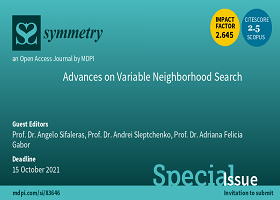Variable Neighborhood Search for Symmetrical and Asymmetrical Optimization Problems
A special issue of Symmetry (ISSN 2073-8994). This special issue belongs to the section "Computer".
Deadline for manuscript submissions: closed (31 December 2021) | Viewed by 2542

Special Issue Editors
Interests: operations research; optimization; metaheuristics
Interests: optimization modeling; stochastic processes; inventory; service parts supply
Special Issues, Collections and Topics in MDPI journals
Interests: discrete optimization problems; stochastic processes and their applications in operations research; applications of machine learning in optimization; operations research and management; combinatorial optimization; inventory; storage; reservoirs; transport
Special Issue Information
Dear Colleagues,
The 8th International Conference on Variable Neighborhood Search (ICVNS 2021) will be held in Abu Dhabi, U.A.E., on 21–25 March 2021 (http://www.icvns2020.info), and plans to continue the success of the previous ICVNS conferences. It will provide a stimulating environment in which researchers from various scientific fields can share and discuss their knowledge, expertise, and ideas related to the VNS metaheuristic and its applications. A key goal of the ICVNS conferences is the interdisciplinary synergy between scientists in the areas of operations research, computer science, and artificial intelligence, in order to mutually develop new methods for various optimization problems and machine learning tasks. This call for papers is dedicated to contributions on theoretical, methodological, or applied aspects of the VNS metaheuristic. This Special Issue is intended to cover both symmetrical and asymmetrical optimization problems occurring in real-life problems. Although we strongly encourage submissions from authors who attended ICVNS 2021, this call for papers is also open and welcomes submissions from the entire community of academics and practitioners. Please note that all submitted papers must be within the general scope of the Symmetry journal.
Prof. Dr. Angelo Sifaleras
Prof. Dr. Andrei Sleptchenko
Prof. Dr. Adriana Felicia Gabor
Guest Editors
Manuscript Submission Information
Manuscripts should be submitted online at www.mdpi.com by registering and logging in to this website. Once you are registered, click here to go to the submission form. Manuscripts can be submitted until the deadline. All submissions that pass pre-check are peer-reviewed. Accepted papers will be published continuously in the journal (as soon as accepted) and will be listed together on the special issue website. Research articles, review articles as well as short communications are invited. For planned papers, a title and short abstract (about 100 words) can be sent to the Editorial Office for announcement on this website.
Submitted manuscripts should not have been published previously, nor be under consideration for publication elsewhere (except conference proceedings papers). All manuscripts are thoroughly refereed through a single-blind peer-review process. A guide for authors and other relevant information for submission of manuscripts is available on the Instructions for Authors page. Symmetry is an international peer-reviewed open access monthly journal published by MDPI.
Please visit the Instructions for Authors page before submitting a manuscript. The Article Processing Charge (APC) for publication in this open access journal is 2400 CHF (Swiss Francs). Submitted papers should be well formatted and use good English. Authors may use MDPI's English editing service prior to publication or during author revisions.
Keywords
- Metaheuristics
- variable neighborhood search
- combinatorial optimization
- global optimization
- machine learning
- interdisciplinary optimization approaches
- multidisciplinary optimization
- symmetrical/asymmetrical optimization problems







